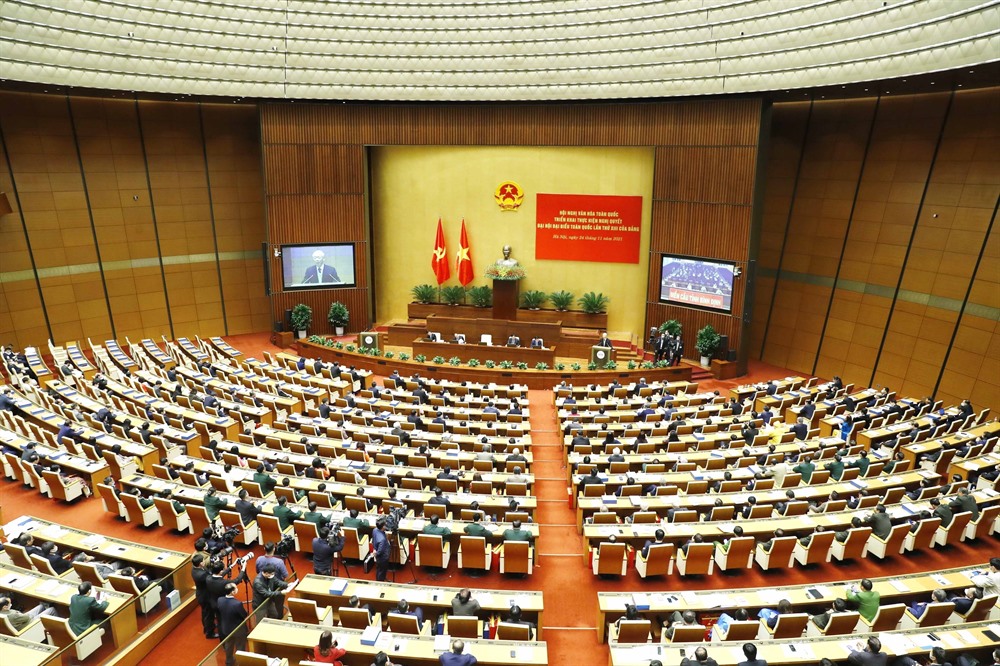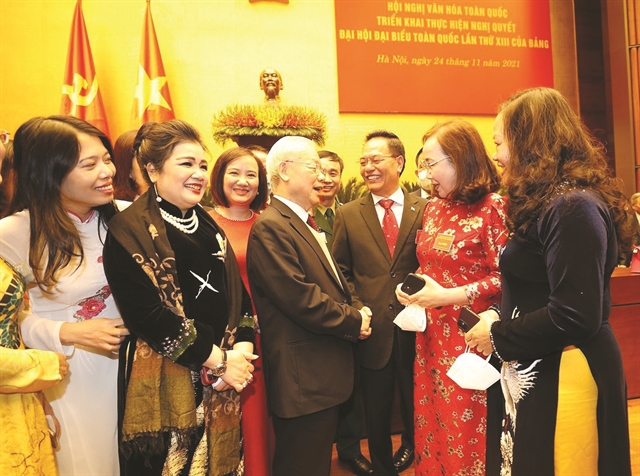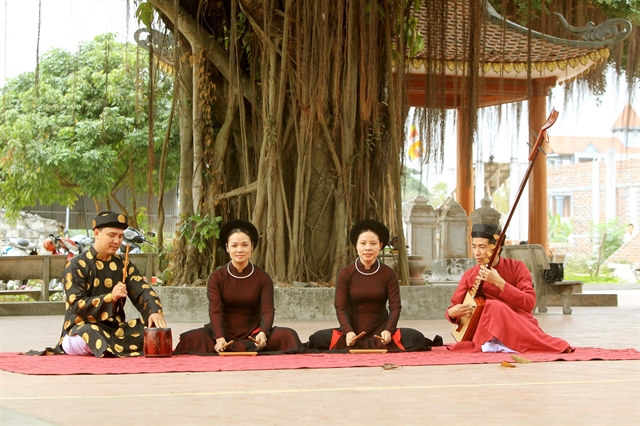 Life & Style
Life & Style

A conference to celebrate and preserve Việt Nam’s cultural heritage has been launched with top government officials including President Nguyễn Xuân Phúc and Party General Secretary Nguyễn Phú Trọng in attendance.

|
The National Cultural Conference. VNA/VNS Photo Trí Dũng
Party leader Trọng praised the great contributions of the entire Party, people, Party members, and the intellectuals and artists in the field of culture in recent times.
This is the second National Cultural Conference to be held since 1946. It aims to invigorate national aspirations as the country enters a new period of rapid and sustainable development.
The National Cultural Conference will implement the 13th National Party Congress’ Resolution. In keeping with pandemic prevention and control measures, 63 provinces and cities nationwide will access events via video link.
The conference, which is held by the Politburo and the Party Central Committee’s Secretariat, was also attended by National Assembly Chairman Vương Đình Huệ, permanent member of the Party Central Committee’s Secretariat Võ Văn Thưởng, among others.
Leaders of ministries, sectors, central agencies, the Việt Nam Fatherland Front, and localities across the nation, along with representatives from socio-political organisations, art, and cultural associations, as well as scientists, cultural experts, intellectuals, and artists, are also taking part.

|
| General Secretary Nguyễn Phú Trọng at The National Cultural Conference. VNA/VNS Photo Trí Dũng |
The General Secretary said the country has every right to feel proud, after achievements made in building and developing Vietnamese culture under the leadership of the Party in the past 35 years of renovation.
“We have the right to be proud of the great contributions of culture to the national salvation and construction,” he said.
Faced with new opportunities and challenges, Secretary Trọng emphasised the need to continue building, preserving, and developing Vietnamese culture; promote cultural values and human strength of Việt Nam, arouse aspirations to develop the country to become prosperous, create the synergy of the whole nation to take advantage of opportunities, overcome challenges, successfully achieve the goal of turning Việt Nam into a socialist-oriented developed country by the middle of the 21st century.
He also stressed cultural development as one of the key issues, a prominent content in the document of the 13th Party Congress.
During the conference, participants also reviewed the implementation of the Party’s orientations, policies, resolutions, directions, and conclusions regarding cultural and art activities over the years, as well as the outcomes of the development of the Vietnamese culture and people after 35 years of the “Đổi mới” (Renewal) cause, while defining new orientations and tasks in the work for the 2021-2026 period and until 2045.
According to Nguyễn Trọng Nghĩa, Chairman of the Party Central Committee’s Commission for Publicity and Education, in the future, the situation in the world and the region will continue to develop rapidly and unpredictably. Traditional and non-traditional security challenges, as well as the development of the 4th industrial revolution, have had a strong impact on national identity and culture.
Domestically, the process of accelerating industrialisation and modernisation of the country and international integration; the implementation of the socialist-oriented market economy mechanism, the development of information technology, and modern media will have a profound impact on the development of culture and Vietnamese people, especially with the younger generation.
That context requires continuing raising awareness about the position and role of cultural development in the period of renewal and sustainable development of the country; identifying cultural development and human development as the central task.
Nghĩa also emphasised that it is very important to educate people to properly apply the concept of building and developing culture and strengthening the inspection, supervision, reward, and handling of cultural leadership and management activities.
In addition, Nghĩa also offers another solution that is to focus on researching, identifying, and developing a national value system, cultural value system, and standards associated with preserving and developing Vietnamese family values; focus on building the Vietnamese people to develop comprehensively, focusing on fostering patriotism, national pride, morality, lifestyle, and personality; taking care of the education, training, and protection of children.
Recently, Deputy Prime Minister Vũ Đức Đam approved the Cultural Development Strategy to 2030, which is one of the major discussion contents of the National Culture Conference 2021 that is slated for November 24.
The cultural sector is working to turn cultural resources of the nation into soft power, thus promoting the cultural values and strength of the Vietnamese people, and contributing to speeding up fast and sustainable development.
To this end, the Culture, Sports, and Tourism sector has defined eight major pillars of the cultural resources that can be transformed into cultural soft power suitable to the common criteria of the world.
According to Minister of Culture, Sports and Tourism Nguyễn Văn Hùng, the strategy offers 11 major tasks and solutions, including raising public awareness of the Party viewpoints and President Ho Chi Minh’s thoughts of culture regarding the building and development of the culture and people of Việt Nam in the new situation.
The Minister stressed the need to complete institutions, policies, and legal corridors by reviewing all legal documents and solving bottlenecks in the field.
At the same time, it is necessary to develop the cultural industry, he said, underlining the necessity of building a healthy cultural environment to create motivation for national development.
He also highlighted the need to improve the quality and efficiency of cultural activities, preserve and promote the cultural identities of 54 ethnic groups.
Another important task of the sector is to protect and promote the values of heritage, especially UNESCO-recognised heritage and special national heritage, he said.

|
| Ca Trù, an original art performance, a Vietnamese cultural activity recognised by UNESCO is being preserved and developed. VNA/VNS Photo An Đăng |
According to Minister Hùng, the strategy sets a target of making a contribution of seven per cent from the cultural industry to the GDP.
In the future, it is necessary to strengthen international integration to promote the image of the nation and people of Việt Nam to the world, enhancing the quality of human resources of the cultural sector, and increasing the application of science and technology in the field to better popularise cultural messages and values to the community, said the official.
The minister also underlined the need to seek resources, including those from the State and the community for cultural development.
With the ideas and proposals at the Cultural Conference, the cultural field of Việt Nam will witness many changes, arousing the aspirations of the whole nation to enter a new era, focusing on rapid and sustainable development of the country, the Minister concluded. VNS




